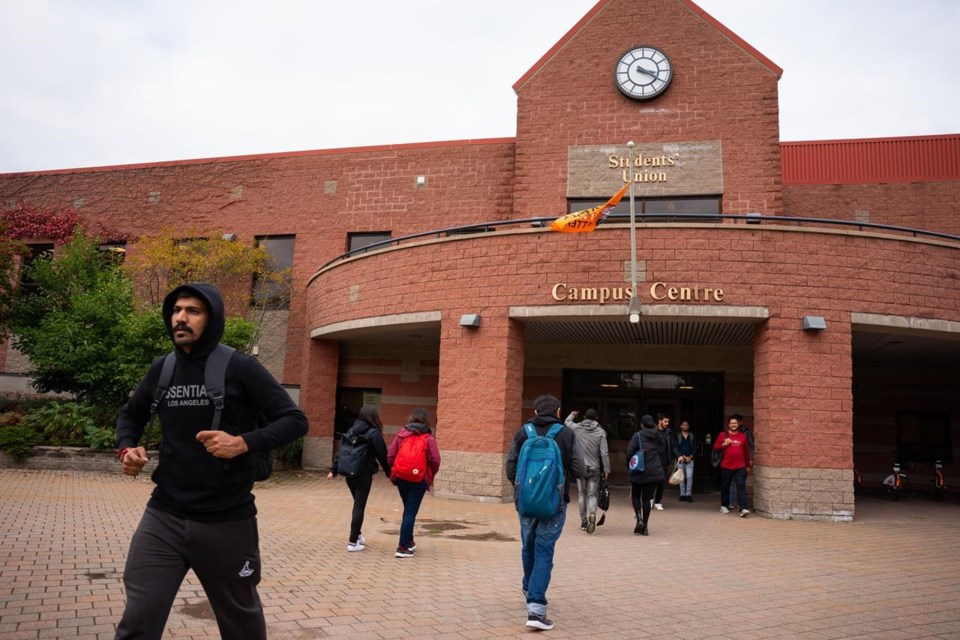SYDNEY, N.S. — Cape Breton University has implemented a new code of conduct for international recruiters aimed at protecting prospective students from misleading claims about the school and off-campus life.
Joel Inglis, the university’s manager of international digital strategy and partnership development, said in an interview Wednesday the new policy is a tool to ensure that arriving students are being given an honest picture of what to expect. Recruiters “need to be giving students real information and not misguiding or misleading them," Inglis said.
The new code follows criticism from international students who have claimed that recruiters contracted by the university have been dishonest about the state of affordable rental housing in Sydney, N.S., and the availability of part-time work in the region.
For example, Inglis said school officials have heard from students who were told they could rent an apartment in Sydney for $300 a month when housing in the area typically costs at least twice that.
“A much more realistic scenario is a two-person shared accommodation for $1,200 to $1,500," he said. "That’s the messaging that we want to go out."
When the school learns of inaccurate claims made to students, Inglis said they will work to track down the origin of the claim and follow up with the recruiting agency.
“It’s my job to talk to agents and let them know what the real situation is and that they need to be sharing that with students,” Inglis said.
If an agent is giving incorrect information, “we need to know if that’s a problem with them not receiving enough training … or it could be more malicious, and they’re knowingly misinforming someone.” If that were the case, the school would cancel the recruiting contract, he said.
Student union president Sahilpreet Singh Chatha said in an interview Wednesday he's pleased the school is taking action to better prepare incoming students.
"We’ve been hearing from students over the past few years who say they did not know what they were getting into," said Chatha, a public administration student from India.
He said he does what he can to answer questions from prospective international students and their families and let them know what potential challenges exist at Cape Breton University.
He said he talks to a lot of dads and moms back home in India whose children have applied to Cape Breton University. “I tell them there is a lack of jobs here and a lack of housing," Chatha said. "They deserve to know that and what kind of campus they’re coming to.”
Chatha estimates that one-fifth of new international students he meets while doing pickups at the airport have told him "they never knew it was going to be so small, or that they never knew the campus was outside of downtown Sydney."
International student recruitment has been driving Cape Breton University’s enrolment growth in recent years. Five years ago, when the university had 3,500 students, about 35 per cent were from outside of Canada. This year, about 77 per cent of the school’s 9,100 students are international.
The school has grown by more than 3,000 students since last year, which the school said is due in part to the arrival of international students who had deferred taking their courses during the COVID-19 pandemic.
In March, the student union said food insecurity had become a concern for many students. Former union president Damanpreet Singh said at the time this was likely due to the rising cost of living and the scarcity of available work for students in the Sydney area.
Singh said that since he moved to Sydney in May 2021, the typical rent paid by students jumped from $350 per month for a room to between $500 and $800, and there are also fewer units available.
Inglis said recruiters must be forthright with international students about the rising cost of living in Cape Breton.
“We don’t want students to come here thinking the savings they have will get them through two years when maybe it would realistically only get them through one year,” he said.
In October the school announced it would be scaling back the number of international students it admits, with a plan to drop the student population to 7,000 by fall 2027. The university is also hoping to increase the domestic pool of applicants, with a goal of having 40 per cent of its students coming from within Canada by the same year.
This report by The Canadian Press was first published Dec. 20, 2023.
-- By Lyndsay Armstrong in Montreal
The Canadian Press



